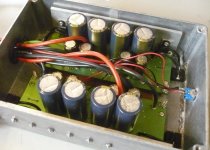Hyena
10 GW
Hey guys,
has anyone tried using a low voltage DC DC inverter / step up transformer to get more speed out of their motors ?
I know I'll lose current/torque but I'm wondering if the increase in voltage would be worthwhile ? Even if it's a step up from say 36 to 60v ?
I'm trying to get more speed without having to add another tonne of batteries (I'm doing it on the cheap using SLA)
Is this doable or a silly idea ?
Cheers
Jay
has anyone tried using a low voltage DC DC inverter / step up transformer to get more speed out of their motors ?
I know I'll lose current/torque but I'm wondering if the increase in voltage would be worthwhile ? Even if it's a step up from say 36 to 60v ?
I'm trying to get more speed without having to add another tonne of batteries (I'm doing it on the cheap using SLA)
Is this doable or a silly idea ?
Cheers
Jay


